|
|
|
Sort Order |
|
|
|
Items / Page
|
|
|
|
|
|
|
| Srl | Item |
| 1 |
ID:
128265
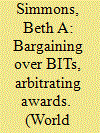

|
|
|
|
|
| Publication |
2014.
|
| Summary/Abstract |
The regime for international investment is extraordinary in public international law and controversial in many regions of the world. This article explores two aspects of this set of rules: its decentralization and the unusual powers it gives to private actors to invoke dispute settlement. Decentralization has contributed to a competitive environment for ratification of bilateral investment treaties (BITs) and has elevated the importance of dyadic bargaining power in the formation of the regime. Governments of developing countries are more likely to enter into BITs and tie their hands more tightly when they are in a weak bargaining position, which in turn is associated with economic downturns of the domestic economy. Once committed, investors have sued governments with surprising regularity, arguably contributing disproportionately to legal awards that favor the private corporate actors who have the power to convene the dispute settlement system. States have begun to push back, revising their obligations and attempting to annul arbitral awards. One of the conclusions is that it is important not only to consider whether BITs attract capital-which has been the focus of nearly all the empirical research on BIT effects-but also to investigate the governance consequences of the international investment regime generally.
|
|
|
|
|
|
|
|
|
|
|
|
|
|
|
|
| 2 |
ID:
125053
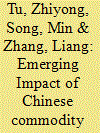

|
|
|
|
|
| Publication |
2013.
|
| Summary/Abstract |
In this paper we construct a set of indices that capture the special features of the Chinese commodity futures market for the period from January 2000 to December 2011 to analyze the general properties of China's commodity futures market. Using these indices we investigate the risk premiums of Chinese commodity futures and verify that the commodity futures can act as an effective diversification tool for Chinese asset management. It is found that the commodity futures can hedge both expected and unexpected inflation in China, and agricultural commodity futures are found to signal inflation 2 months beforehand. Finally, we explore the relationship between Chinese and US commodity futures markets in the years 2000 and 2010, and find that their interactions strengthen over time. Our research reveals an increasingly important role of the Chinese commodity futures market in both the domestic and the global economy. Some policy changes are suggested in response to this trend.
|
|
|
|
|
|
|
|
|
|
|
|
|
|
|
|
| 3 |
ID:
128266


|
|
|
|
|
| Publication |
2014.
|
| Summary/Abstract |
Although many features of bilateral investment treaties (BITs) are consistent from one agreement to the next, a closer look reveals that the treaties exhibit considerable variation in terms of their enforcement provisions, which legal scholars have singled out as the central component of the treaties. An original data set is compiled that captures three important treaty-design differences: whether the parties consent in advance to international arbitration, whether they allow treaty obligations to be enforced before an institutionalized arbitration body, and how many arbitration options are specified for enforcement. Drawing upon several relevant literatures on international institutions, three potentially generalizable explanations for this important treaty variation are articulated and tested. The strongest support is found for the theoretical perspective that emphasizes the bargaining power and preferences of capital-exporting states, which use the treaties to codify strong, credible investor protections in all their treaties. Empirical tests consistently reveal that treaties contain strong enforcement provisions-in which the parties preconsent to multiple, often institutionalized arbitration options-when the capital-exporting treaty partner has considerable bargaining power and contains domestic actors that prefer such arrangements, such as large multinational corporations or right-wing governments. In contrast, there is no evidence to support the popular hands-tying explanation, which predicts that investment-seeking states with the most severe credibility problems, due to poor reputations or weak domestic institutions, will bind themselves to treaties with stronger investment protections. likewise, little support is found for explanations derived from the project on the rational design of international institutions, which discounts the identities and preferences of the treaty partners and instead emphasizes the structural conditions they jointly face. In sum, this foundational study of differences across investment treaties suggests that the design of treaties is driven by powerful states, which include elements in the treaties that serve their interests, regardless of the treaty partner or the current strategic setting.
|
|
|
|
|
|
|
|
|
|
|
|
|
|
|
|
| 4 |
ID:
128267
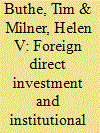

|
|
|
|
|
| Publication |
2014.
|
| Summary/Abstract |
International trade agreements lead to more foreign direct investment (FDI) in developing countries. This article examines the causal mechanisms underpinning this trade-investment linkage by asking whether institutional features of preferential trade agreements (PTAs), which allow governments to make more credible commitments to protect foreign investments, indeed result in greater FDI. The authors explore three institutional differences. First, they examine whether PTAs that have entered into force lead to greater FDI than PTAs that have merely been negotiated and signed, since only the former constitute a binding commitment under international law. Second, they ask whether trade agreements that have investment clauses lead to greater FDI. Third, they consider whether PTAs with dispute-settlement mechanisms lead to greater FDI. Analyses of FDI flows into 122 developing countries from 1971 to 2007 show that trade agreements that include stronger mechanisms for credible commitment induce more FDI. Institutional diversity in international agreements matters.
|
|
|
|
|
|
|
|
|
|
|
|
|
|
|
|
| 5 |
ID:
123830
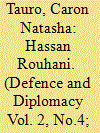

|
|
|
| 6 |
ID:
124163
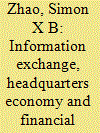

|
|
|
|
|
| Publication |
2013.
|
| Summary/Abstract |
Over the past several years, China has consistently maintained economic growth and at the same time emerged as a new global giant in the international arena, despite the distractions caused by the global financial crisis, which was triggered by the US Sub-prime Mortgage Crisis of 2007 and the recent bond crisis that emerged in the European Union in 2011. Concurrent with China's growing interaction with the global economy and robust growth of its domestic economy, competition for the status of national and even international financial centers in the region has become fierce. This study focuses on a 'local' examination of internal conditions for the emergence and growth of Chinese financial centers over the next 10-20 years. Cities contending for the top slot in the roster of Chinese cities, like Beijing, Shanghai and Shenzhen, are striving to become international financial centers and are trying to compete with Hong Kong. This study investigates the development potentials, future prospects and division of functions between different financial centers within China regarding Hong Kong, Beijing and Shanghai, with special reference to the role of information and locations of MNCs' regional headquarters.
|
|
|
|
|
|
|
|
|
|
|
|
|
|
|
|
| 7 |
ID:
123642
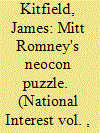

|
|
|
|
|
| Publication |
2012.
|
| Summary/Abstract |
AMERICANS WILL enter voting booths in November fixated on a sputtering domestic economy, but they will exit having elected the single most influential player on the world stage. That reflects a paradox of American power: a generally inward-looking electorate selects a leader with only scant attention to his foreign policies or international experience, and yet that person's actions undoubtedly will shape the course of global events. And into the center of that paradox walks the enigma that is Mitt Romney.
|
|
|
|
|
|
|
|
|
|
|
|
|
|
|
|
| 8 |
ID:
120689
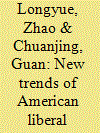

|
|
|
| 9 |
ID:
086414


|
|
|
|
|
| Publication |
2009.
|
| Summary/Abstract |
Both parties to an eventual EU India FTA have agreed that it should not merely address tariff barriers but should also go further into what is known as deep integration, originally developed in the 1990s by R.Z. Lawrence. This relates to the removal of all obstacles to cross border business whether actual trade barriers or domestic regulations. We distinguish deep institutional integration from the deep integration of markets. We ask the question how one may support the other. There are potential market failures that can be addressed by trans-national rules on standards and technical regulations and services, but we conclude that the biggest impact of a deep RTA would be on the domestic economy of India if it provides an opportunity for reform. It should be noted that the paper draws on a study undertaken by the authors for DG Trade, but it represents only the views of the authors.
|
|
|
|
|
|
|
|
|
|
|
|
|
|
|
|
| 10 |
ID:
101654


|
|
|
|
|
| Publication |
2011.
|
| Summary/Abstract |
This article is primarily a conceptual overview on the theme of a grand strategy for a rising power such as India. The objective is to promote a systematic and structural way of thinking on grand strategy-the dynamic art of relating ends and means. The author identifies and expounds on the major domestic and international variables that will shape India's grand strategy. Factors such as national ethos, domestic political economy, geopolitical context, nature of economic interdependence, the impact of the nuclear revolution, and the evolving structure of the international system all influence the environment in which Indian power is deployed. The author not only contextualises the impact of these variables but also offers select strategic responses to these multiple factors that will circumscribe an Indian grand strategy.
|
|
|
|
|
|
|
|
|
|
|
|
|
|
|
|
| 11 |
ID:
132507
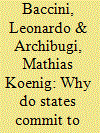

|
|
|
|
|
| Publication |
2014.
|
| Summary/Abstract |
Ratifying core conventions adopted by the International Labor Organization (ILO) creates legal obligations to improve labor standards in the domestic economy, notably with regard to union rights, minimum age and discrimination in employment, and forced labor. Why and when do states choose to ratify them? Two influential theoretical approaches lead to the expectation that states are influenced by the ratification behavior of other states. Drawing on rationalist institutionalism, the authors expect states to use institutions such as the ILO to improve or consolidate their preferred standards domestically while reducing the risk of suffering competitive disadvantages in world markets. In this view, ILO conventions are devices for the prevention and mitigation of regulatory races to the bottom among trade rivals. Drawing on sociological institutionalism, they expect states to ratify ILO conventions if doing so conforms to a norm of appropriate behavior that is prevalent in a state's peer groups. This article develops observable implications of these hypotheses and tests them by applying spatial regression models to seven core ILO conventions and 187 countries between 1948 and 2009. The analysis yields strong evidence in support of both hypotheses.
|
|
|
|
|
|
|
|
|
|
|
|
|
|
|
|
|
|
|
|
|